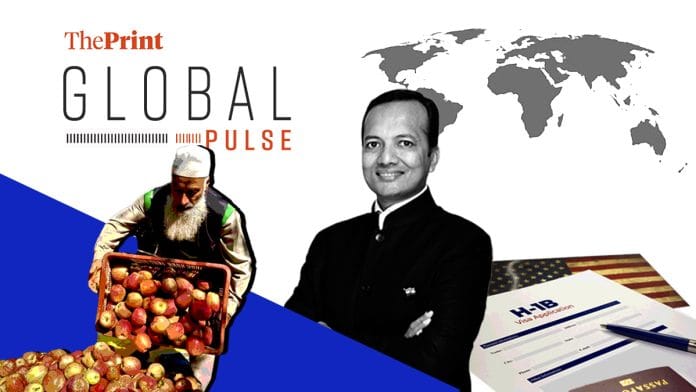New Delhi: US President Donald Trump’s 100,000 fee on H-1B visa applicants has Indian aspirants panicking. But analysts and experts have been pointing to a silver lining––the country will be able to retain its talent.
However, in The Washington Post, Karishma Mehrotra and Supriya Kumar report on the absence of infrastructure in India to absorb Indian professionals.
Indian IT firms like TCS, Wipro and Infosys are also highly dependent on the US. “Indian IT giants form the backbone of a $250 billion services industry that provides offshore technology work for foreign clients. But the companies also hire extensively in the United States, and many of their employees are Indians on H-1B visas. Major firms at the center of the export model, such as Tata Consultancy Services, Wipro and Infosys, saw their share prices tumble this week,” the report says.
Indians are also reluctant to move back home.
“Some Indian professionals who took their talents to the United States said there are simply no comparable opportunities back home,” it adds.
“In the whole of India, nobody is touching the kind of robotics work I do here,” Shivam Bhardwaj, an engineer on an H-1B visa in San Jose, is quoted as saying.
In 2014, he tried to start a company in India but was unsuccessful. “There is no ease of doing business,” the 31-year-old tells The Post, referring to India’s “legal and bureaucratic challenges”.
“The reasons we left India are still there,” Bhardwaj concluded, saying he would sooner look to Singapore than to his home country to continue his career. And for other young Indians who were hoping to follow his path, “their future is jeopardised”, he said, according to the report.
In Financial Times, Chris Kay and Sebastien Ash profile Naveen Jindal, steel tycoon who is supposedly called “Captain Cool” by his polo mates.
Jindal has made an offer to buy the “floundering steel assets” of German industrial group Thyssenkrupp –– and has “pledged to invest more than 2 billion pounds”.
“A successful takeover would vault Jindal, who owns India’s fourth-largest steel producer, into the world’s leading makers of the metal, with sprawling but integrated assets that include mines in Africa and Australia, as well as steel plants in Oman and Europe. It would also mark his second major acquisition in the region,” says the article.
But all is not rosy. Analysts told the FT that Jindal’s push into Europe comes amid “low demand across markets, cheap imports and high energy costs”.
Meanwhile, it asserts, when it comes to Jindal, “boldness” is a family trait.
“Boldness runs in the family. Jindal’s father, Om Prakash Jindal, was regarded as a pioneer in India’s steel sector before dying in a helicopter crash in 2005,” says the report.
“Naveen Jindal’s appetite for international adventure is not new. His listed Indian company signed an agreement to invest $2.1bn in a Bolivian mining and steel project in 2007. He eventually pulled the plug on the project following frictions with Bolivia’s leftist government,” it adds.
In Jammu & Kashmir, apple farmers are struggling as this year’s unrelenting monsoon destroyed their crops and rid them of customers, report Pragati K.B. and Showkat Nanda in The New York Times.
“The authorities shut the highway for almost two weeks in late August, and restricted heavy trucks from using the road through Sept. 17, to make repairs. That left harvested apples, packed in boxes and loaded onto trucks, stranded. They began to rot, and the crop still in the region’s orchards went unpicked,” says the report, noting that Kashmir accounts for over 70 percent of India’s apple harvest.
“Just two months ago, Mr Ashraf, the apple farmer, was a hopeful man. He had a good crop this year from his one-acre orchard and expected to make a profit of $4,600. Then came the rains in August, heavier and earlier than expected. Some of his produce was lost in the deluge, but he still had plenty to sell and make a comfortable profit. Then he heard the highway was closed, and he lost hope. He stopped picking the apples,” it adds, narrating one man’s story that reflects the state of affairs.
(Edited by Nida Fatima Siddiqui)
Also Read: Nepal uprising ‘distraction’ for New Delhi & India’s top buyer of Russian oil escapes Trump’s wrath






